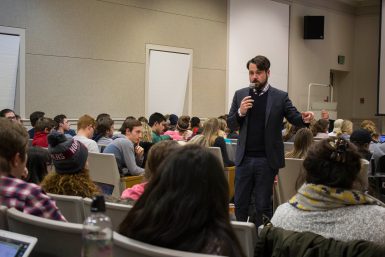POLITICO reporter talks about challenges, opportunities of reporting on Trump
POLITICO senior staff writer Michael Kruse said he believes reporters covering the White House work harder than ever before. The constant news cycle and nontraditional president bring new challenges to journalism. Kruse discussed his experience the last three years writing about now-President Donald Trump with students on Monday.
“He’s a really, really interesting guy, and he’s a really, really important person, and the goal is to report on and write about a combination of things that are interesting and important,” Kruse said. “As a reporter, he is a fascinating subject.”

Kruse, who visited Monday, is the latest guest to speak to professor of practice Tom French’s MSCH-C204: Behind the Prize class, which hosts prize-winning professional journalists as weekly lecturers. Kruse spent 10 years at the Tampa Bay Times, where he won awards including the American Society of News Editors’ distinguished non-deadline writing award before joining POLITICO during the most recent presidential campaign.
“He avoids the trap of, you know, ‘This candidate good, or this person bad,’” French explained to his class. “He’s really into the complexity of, obviously the president, but also the people who are out there voting — who voted for him, or who are now trying to find ways to get people to vote for Democrats in the coming midterms. There’s a complexity I just really, really appreciate.”
Political reporting is a fairly recent endeavor for Kruse, however. His first job out of college was as a high school basketball scout after he spent most of his middle school and high school days thinking he’d be a sports reporter. He ultimately transitioned into sports reporting at the Tampa Bay Times, and a job with POLITICO followed. Understanding the high stakes for high school basketball recruits gave Kruse a foundation for reporting on politics.
“The stakes are so high, and whenever the stakes are high, there are stories just by definition,” Kruse said.
Kruse’s recent work includes “The Loneliest President” and “Heartland Democrats to Washington: You’re Killing Us.” His articles strike nerves and make conversations being had about party lines and the president’s psyche a little more public.
When Kruse started writing about politics, he spent his first year building a network of contacts in Washington and reading as many political books as he could. Now he gets people to open up in interviews about their own political views, sensitive subjects and thoughts on the president.
“I think if people are talking to somebody who is curious and hopefully not judgmental and is presenting in some nonthreatening way, people do want to share because it matters,” Kruse said.
The key is to “de-stranger” the relationship as quickly as possible, Kruse said. Change the interview’s dynamic from stranger-to-stranger to person-to-person. That’s when you get the green light from the interviewee to talk about more sensitive subjects.
Kruse compared this interaction to scuba diving. You can’t scuba dive immediately. You start by swimming along with somebody and feeling it out. As something comes up on the surface and shows itself, you can dive a little deeper. Maybe then you find something else and dive deeper toward that.
“Once you get there, and the person has allowed you to get there, then you can just sort of sit there for a second because we got there,” Kruse said. “And because we got there, that’s a green light.”
In journalism, as with politics or anything in life, Kruse said, things move quickly. He had no way of knowing he would spend time profiling the president, but his ability to talk to people and understand stakes got him where he is today.
“If you move in some direction with some purpose, and you present yourself as a curious person, as a generally motivated person, however that might come across, things are going to happen for you. You’re going to go somewhere.”
More:

